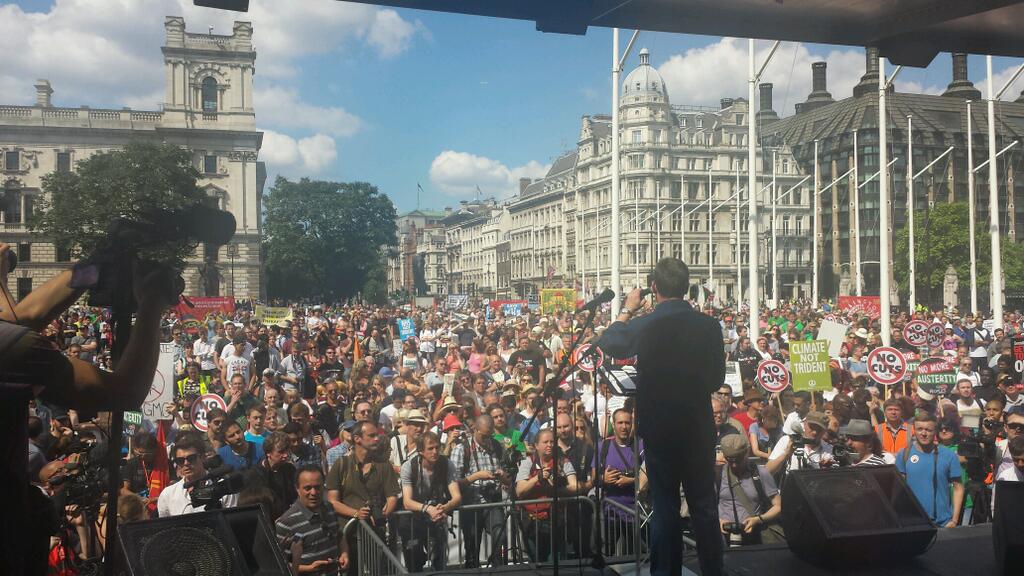
Last Saturday saw an estimated 50,000 people march through the streets of London to oppose austerity. Interestingly trade unions played a primarily supportive role, the event instead being organised and hosted by the non-partisan People’s Assembly Against Austerity (PA). The march drew some attention from left-leaning sections of the press, primarily due to Russell Brand’s speech at the Parliament Square rally, but many have expressed their dismay at what they’re calling a ‘media blackout’ on the part of the BBC. Others have pointed out – particularly bluntly – that perhaps the march was simply not newsworthy. News coverage or not, can the anti-austerity movement offer us the solutions we’re looking for? Here are a few reflections on the anti-austerity movement as it stands:
1. It’s difficult to find anything special about the most recent march.
This is harsh but comes from a position of love. Okay, Russell Brand was there and so were Owen Jones and Caroline Lucas. We could even point to the fact that the demo was called by the relatively grassroots People’s Assembly rather than clunky actors such as the TUC or NUS. But apart from this, there really seems to be little of note about this demo to separate it out from the others over the past four years. Indeed, some photos used in the (limited) coverage of Saturday’s march were actually taken from prior away-days. It’s an easy mistake to make: the placards were largely the same too. Perhaps the most notable thing – as difficult as it is to swallow – is that the anti-austerity movement, in its current form, has been able to retain 50,000 people.
2. Yes the BBC is biased, but ‘media blackout’ is self-indulgent.
As Novara has been keen to note in the past, our esteemed regime broadcaster surpasses itself when it comes to biased reporting and vested interests. The BBC also controls the parameters of debate and over-reports on all issues Ukip – this has become common knowledge. But in fact the BBC did report on the march, and while it was brief, it basically covered things. The protest was “about the impact of cuts around the country.” Well, it was. There’s nothing ‘blackout’ about it, and we would be indulgent to assume that the well-documented basic opposition to cuts is contentious enough to warrant such treatment. Unfortunately – and it is unfortunate – there was little about this demonstration or its message to offer anything new or provocative to either journalists or the public.
3. The message needs to change and demands need to be made.
There is of course a benefit in demonstrations as part of a plurality of tactics, and there are certainly tangible short and medium term gains which can be made from pressuring both the government and opposition. However, if the anti-austerity movement is to make progress in this area it needs to be able to move beyond the ‘lowest common denominator’ of simply being ‘anti-austerity’ and start making positive demands which propel us towards a more equitable state of affairs. These ideas already exist, and the PA could even be a potentially useful mechanism for articulating them.
Instead, we seem to be following the same pattern of 2010-11: holding meetings then demonstrations aimed at galvanising people and ‘sending a message’. If in four years this strategy has only culminated in us doing the same things and expecting different results, something needs to change. Where we should now be articulating demands we seem to be peddling backwards into a poverty of ideas – even the 2011 TUC march called for ‘jobs, growth and justice’, whatever that looks like. If we want to start changing the political landscape or commanding the narrative we need a 50,000-strong movement which will fight on the front foot by demanding rent caps, universal care or the unconditional basic income. Now that would be newsworthy. Perhaps this is something to think about in the build up to this summer’s demonstrations…
4. There is no going back to the welfare state.
If our movement is going to continue to be characterized by this vague nostalgia for the post-war consensus or the ‘spirit of 45 or the full employment society, we might as well stay at home and enjoy the crisis from our sofas. By clinging to this bygone era we are ignoring that both Britain and the rest of the world are fundamentally different places now from what they were 70 years ago. Neoliberalism has changed the economic and political landscape, post-Fordism has changed the way we work, and automation (and global outsourcing) has contributed to the decline of the manufacturing industry along with the rise of the service sector. It is not possible for everyone to work, and nor should we act as if it’s desirable. Reversing the cuts will not pave our way out of crisis; only alleviate temporarily the worst effects. We have here an opportunity to create and articulate something new and emancipatory, but if the limits of our political imaginaries are to turn the clocks back to yesteryear there is no hope for a better future. Instead we need to be looking properly forward by articulating and advocating new possibilities and solutions.